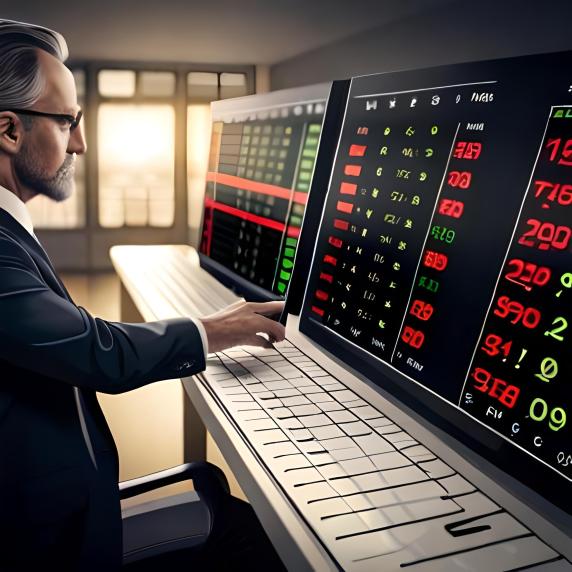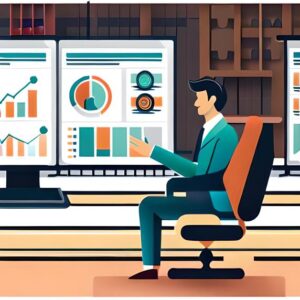If you want to know whether stock trading with AI is possible or if we can utilize AI for trading, or if AI can help us make buying and selling decisions, this article is for you.
The finance world is ever evolving and we have come a long way from a traditional floor trading to electronic trading. There was a time when people used to trade on physical trading floors where traders would buy and sell securities through face-to-face interaction. Today, millions of transactions happen without any human interaction.
So, are we on the verge of an Artificial Intelligence (AI) revolution in the financial world?
Can AI help us make better trading decisions?
What can we expect from AI in stock trading and Investment decisions?
Brace yourself as we embark on a captivating journey into the world of trading stocks with AI, unraveling its vast benefits, exploring its wide-ranging applications, and seeing if AI can uncover the path to achieving unprecedented results in the financial markets.
Embracing AI’s Role in Stock Trading

AI has emerged as the herald of a new era, encompassing computer systems capable of performing tasks that typically necessitate human intelligence. In the realm of stock trading, AI algorithms take center stage, deftly analyzing a deluge of financial data, historical price patterns, news sentiment, and other pertinent factors.
This relentless analysis births invaluable insights and predictions, pushing the boundaries of what’s possible. Powered by the magic of machine learning and deep learning techniques, AI models perpetually refine their strategies, learning from every new data point they encounter.
The Allure of AI in Stock Trading
Enhanced Data Analysis
When you look at numbers or data you can process and inspect them, transforming that data into meaningful conclusions. Many of you make trading decisions by identifying patterns, and trends.
AI can be utilized to process and analyze colossal datasets. This analytical prowess can empower traders to uncover hidden gems and detect elusive trends that elude the unaided human eye. Armed with AI, traders can ascend to new heights of market comprehension, enhancing risk assessment, and paving the way for informed and astute trading decisions.



Real-time Market Monitoring
One of the important activities of trading is continuously observing and tracking the live market data and information as it happens. To make better trading decisions you need to keep a close eye on the latest news, price movements, trading volumes, and many other factors impacting the financial markets.
Here, AI algorithms can make our lives easy and by rapidly processing a stream of market data, news feeds, and social media sentiments. AI is capable of providing Real-time alerts, timely market updates, and fleeting trading opportunities that can allow traders to strike while the iron is hot, leaving no opportunity wasted.



Unveiling Patterns and Predictive Analytics
Predicting patterns requires a lot of practice to understand the recurring patterns and trends in the financial market. It’s a daily task of trader to analyze historical price charts, volume data, market data and other indicators that have occurred in past.
We can utilize AI as it’s knack for pattern recognition and predictive analytics can be truly remarkable. AI can be used to analyze historical price patterns, technical indicators, and fundamental data. AI models can unveil potential market trends and forecast future price movements with precision With AI’s precise predictions, traders can navigate the tumultuous market waters with unparalleled accuracy, skillfully adjusting their strategies along the way.



Unleashing Automated Trading Systems
Automated trading system refers to computer programs or software that automatically executes trades on behalf of traders. They have pre-defined trading strategies, rules and parameters that they follow and do not need any manual intervention. It uses algorithm and mathematical models to analyze the market data, identify trading opportunities and generate buy/sell signals.
Now, you may think that it’s too automated, but once tested and results are verified, automated trading systems can have many benefits. These include the ability to execute trades with speed and accuracy and the elimination of emotional decision-making. Many traders excel at designing superb trading strategies but sometimes fail when the emotions kick in. Automated trading systems take care of that.



The true might of AI comes to the fore with the development of sophisticated automated trading systems. AI can tirelessly execute trades based on predefined rules or signals, unencumbered by the emotional rollercoaster that plagues their human counterparts. Automation can eradicate human errors, ensures consistent execution, and capitalizes on fleeting market inefficiencies, leaving traders in awe of the opportunities seized
The Boundless Applications of AI in Stock Trading
Algorithmic Trading
It also known as Algo Trading and is an automated form of trading. Think of it as when computers are programmed to automatically make decision about buying and selling stocks. You input special instructions like specific parameters about the price levels and technical indicators and that determines when and how trades should be executed.
It works like a big math equation a.k.a algorithms that processes large amounts of data and reacts to market conditions with speed and precision. It’s like a robot that assists people make smart decisions when buying and selling stocks.



The symbiotic relationship between AI and algorithmic trading is truly amazing. The fusion of preprogrammed trading instructions with AI’s analytical capabilities can create complex trading algorithms that adapt to the ever-changing market. These algorithms can execute trades with precision and lightning speed, embracing the constant changes and movements of the market dynamics.
Decoding Sentiment Analysis
It’s a process of analyzing text or data with an intention to understand the emotions or feelings expressed in it. This involves various techniques like natural language processing and machine learning to determine if the emotion is positive or negative.
Think of it as trying to figure out how people feel about a movie, a product or a social media post by reading their reviews. Just like you can tell if someone is happy, sad, or angry by listening to their comments about a movie, computers can do something similar with written words. They use special technique to understand if the words used in the comments are positive, negative or neutral.
AI can take on the role of sentiment analysis, skillfully analyzing news articles, social media sentiments, and textual data to understand the mood of the market. By understanding market sentiment, traders gain a clear advantage, being able to interpret the changing feelings in the market with exceptional skills.



Risk Management Reinvented
Every trader knows the importance of a “Stop Loss”. They analyze the potential risks involved in making buying or selling decisions and take measures to minimize those risks. Traders use many techniques to manage risk, like setting limits on how much money they are willing to risk or lose on a single trade.
Some diversify their investments to spread the risk, while others use stop-loss on orders to automatically sell their investments if the price goes down too much.
It’s like wearing a helmet while riding a bike to keep you safe. Risk management helps you to protect yourself from losing too much money in trading. Managing risk is an integral part of a trader’s daily routine. They think ahead, set limits, spread the risk and put stop-loss on orders.
We can utilize AI in the realm of risk management by developing sophisticated risk assessment models. These models can analyze historical data, market volatility, and a wide range of risk factors. They empower traders with potent tools to assess and mitigate risks. With AI as their ally, traders can navigate the treacherous waters of the financial markets skillfully, minimizing potential losses and maximizing gains.



The Art of Portfolio Optimization
In the context of trading, portfolio optimization refers to carefully selecting different investments such as stocks, bonds, ETFs, Forex, bitcoins, and other financial assets for a portfolio to achieve a best possible return while managing the risk. Traders can create a portfolio that maximizes returns on investment while considering their risk tolerance. By diversifying investments across various financial assets, traders can spread risk as they aim to achieve a balance between potential gains and losses.
You can utilize the transformative potential of AI to optimize portfolios. Through the analysis of historical data, risk profiles, and investment objectives, AI can assist traders in identifying the optimal allocations of assets. With AI-driven portfolio optimization techniques, traders can curate balanced and diversified portfolios that align with their investment goals, positioning themselves for success.



Peering into the Future of AI in Stock Trading
At this time, let us look ahead and imagine how AI will continue to shape and revolutionize the world of trading. It appears to be just the beginning, but with the rapid advancement of technology, the role of AI in stock trading will grow exponentially. AI algorithms have the potential to evolve into even more sophisticated beings that assist us in analyzing complex datasets and adapting to real-time market shifts.
The convergence of AI with emerging technologies like blockchain and big data analytics has the potential to break existing boundaries, unlocking uncharted possibilities and transforming the very essence of stock trading.
However, it is paramount to remember that while AI can offer invaluable insights and decision support, it cannot replace the wisdom and expertise of human traders. Successful trading relies on a deep understanding of market dynamics, astute risk management practices, and the ability to interpret and effectively capitalize on AI-generated insights.



- The Rise of DeFi: How Blockchain is Changing Finance
- The Psychology of Money: Timeless lessons
- Loud Budgeting in 2024
- Stock Market Terms for Beginners
- Digistore24
- October 2024
- February 2024
- December 2023
- October 2023
- September 2023
- August 2023
- July 2023
- June 2023
- May 2023
- April 2023
- March 2023
- February 2023
Related Articles




1 thought on “Stock Trading with AI in 2023”